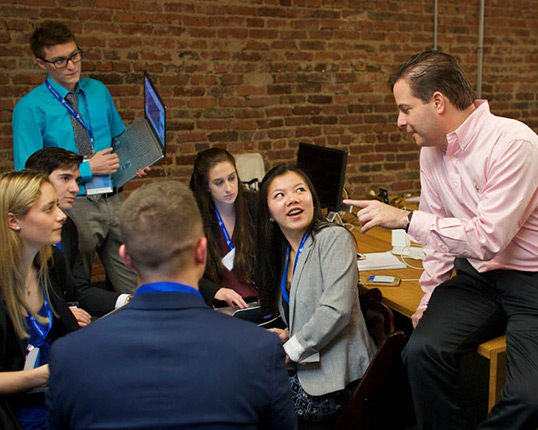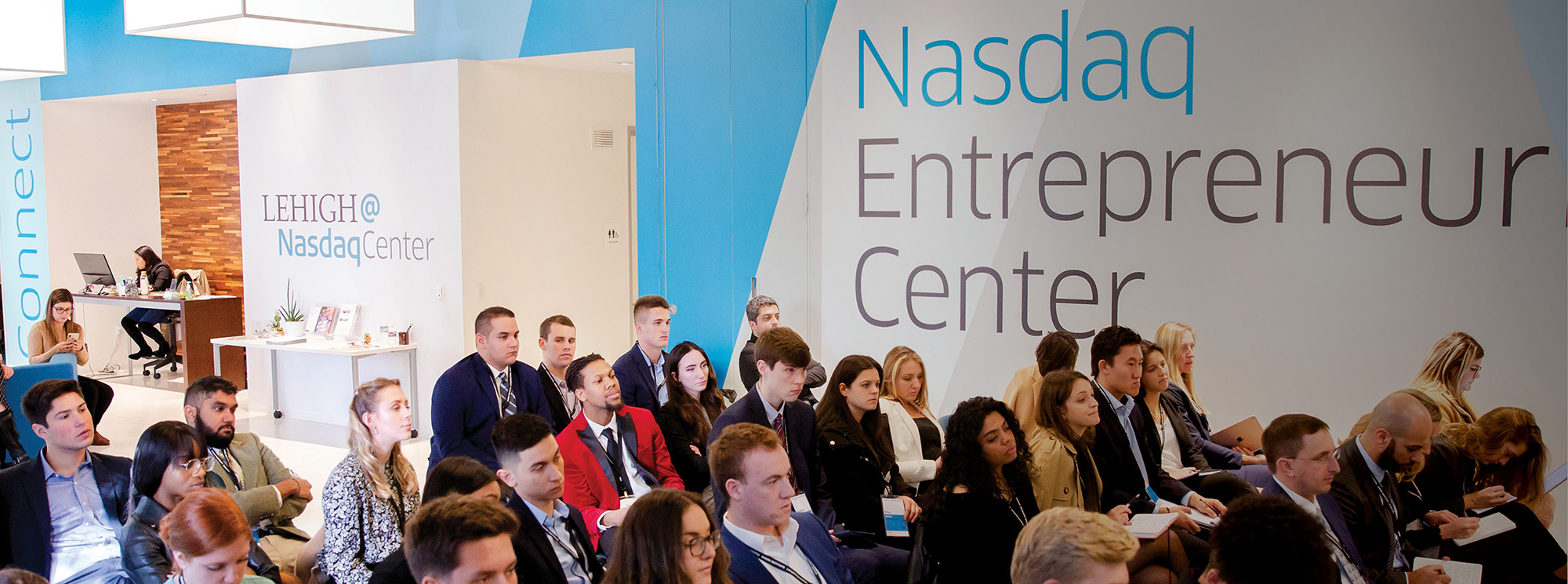Ann Lewnes ’83 opened up the world of Adobe for LehighSiliconValley students—the physical space, the innovation mindset and an intimate look at what it’s like to work one’s way up inside such an iconic brand. She has offered follow-up professional growth opportunities that include internships and externships, and she has participated in the program’s day-long design sprints that focus on students’ path toward professional success by sharing her own journey.
As part of the “UN-resume” workshop, a Baker Institute signature program, Lewnes shares insights as someone who both hires uniquely talented people and has been hired for her unique talents. Students say her insights and open style resonate as they learn to identify and talk about the experiences that differentiate them from their peers.
Lewnes says she can understand why so many students rank LehighSiliconValley as among their top Lehigh experiences.
“Just being here is exciting,” she says. “The second thing is you get to be exposed to some of the greatest companies in the world. And you get to, in the case of Adobe, come for a day, be in the office. They want to hear from employees. And we had a few of the [students] do what we called an externship, and they came and worked on a project for a few days. … The third thing is, it just opens your eyes to what is possible.”
Lewnes’ involvement with the program began several years ago when Lehigh opened its West Coast office and partnered with the Nasdaq Entrepreneurial Center to open the Lehigh@NasdaqCenter in the heart of San Francisco.
The point of the “UN-resume” she says, was to encourage students to think about ways to better position themselves as they pursue their careers upon graduation and to think about what sets them apart from other applicants.
“How do you tell your story, who you are, not tactical projects necessarily that you worked on? You can include that, but what's your special sauce?” Lewnes says.

Paul Martino ‘95, co-founder of Bullpen Capital, meets with LSV participants. Photo: Adrian Mendoza
Paul Martino ’95, co-founder of Bullpen Capital, began hosting LehighSiliconValley Live Case Sessions at Bullpen's headquarters in San Francisco in 2018. Like Lewnes, he has deeply connected with the LSV students and been integral in helping the Baker Institute to engage other alumni entrepreneurs and investors with the program.
“I’m always happy to help teach the next generation of entrepreneurs how to be entrepreneurs,” Martino says. “It's a really hard job path,” but viable.
Many students look for clear milestones in their lives—graduating from college, landing a job, entering medical school, and the like, he says. However, “when you go into entrepreneurship, you don't know what the next milestone is. So just conveying to [LSV cohorts] that there's this alternative career path, where you make it up as you go along, it's really eye-opening, and it suits the demeanor of a lot of students. ... When you get an opportunity to learn from people who've done it before, you can get a sense [whether] this is what you want to do with your life.”
He uses this analogy: No matter what grade students get on an exam, they can look up the answers afterward to check what they got right—and got wrong. “Entrepreneurship is not like that,” he says. “There's no answer key in the back.
“You might have had the best idea but you executed wrong or your idea might have been terrible but you executed it well. … It might be years until you find out if your entrepreneurial endeavor was worth it. And that's very, very unsettling to a lot of students who have never kind of thought about it that way. ‘Oh, no one tells me my idea was good?’ No, no one tells you. You have to have it inside of you to know that your idea was good.”
In the Live Case sessions led by Martino, students have met with the CEOs of startups funded by Bullpen, who talk candidly about the types of decisions they face and share several issues currently facing their companies. Students pepper them with research-based questions, then armed with first-hand information, they work in teams to develop solutions and present their ideas to Martino and the CEOs.
“That's when it gets exciting, Martino says. “The students can feel like they [are] a bit on the inside, as opposed to just, ‘Hey, I got to meet this famous person and shake his or her hand.’”
Learning to think like an entrepreneur isn’t only for nascent founders. Lewnes says, employers at any company, large or small, will often look to hire those who are entrepreneurial thinkers. Companies need both “flag planters” and “road builders,” she says. “Flag planters have these big ideas, and they plant the flag out in the future. And then road builders are the ones who have to execute, to make sure that the team can actually do that. You need both.”
“How do you tell your story, who you are, not tactical projects necessarily that you worked on? You can include that, but what's your special sauce?”
Lewnes says she hopes the students’ Silicon Valley experiences lead them to expand their geographical preferences and consider West Coast companies as they launch their careers.


